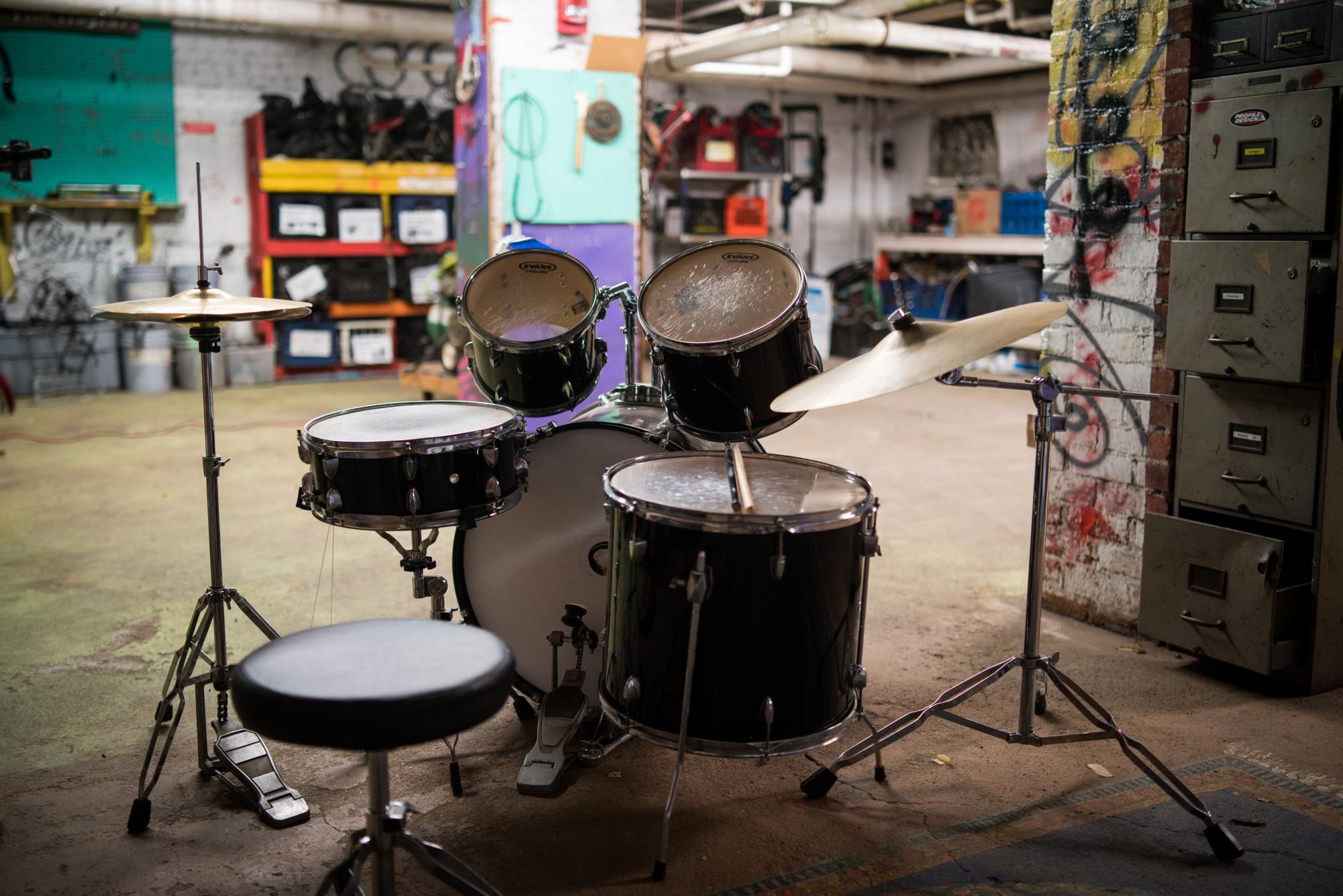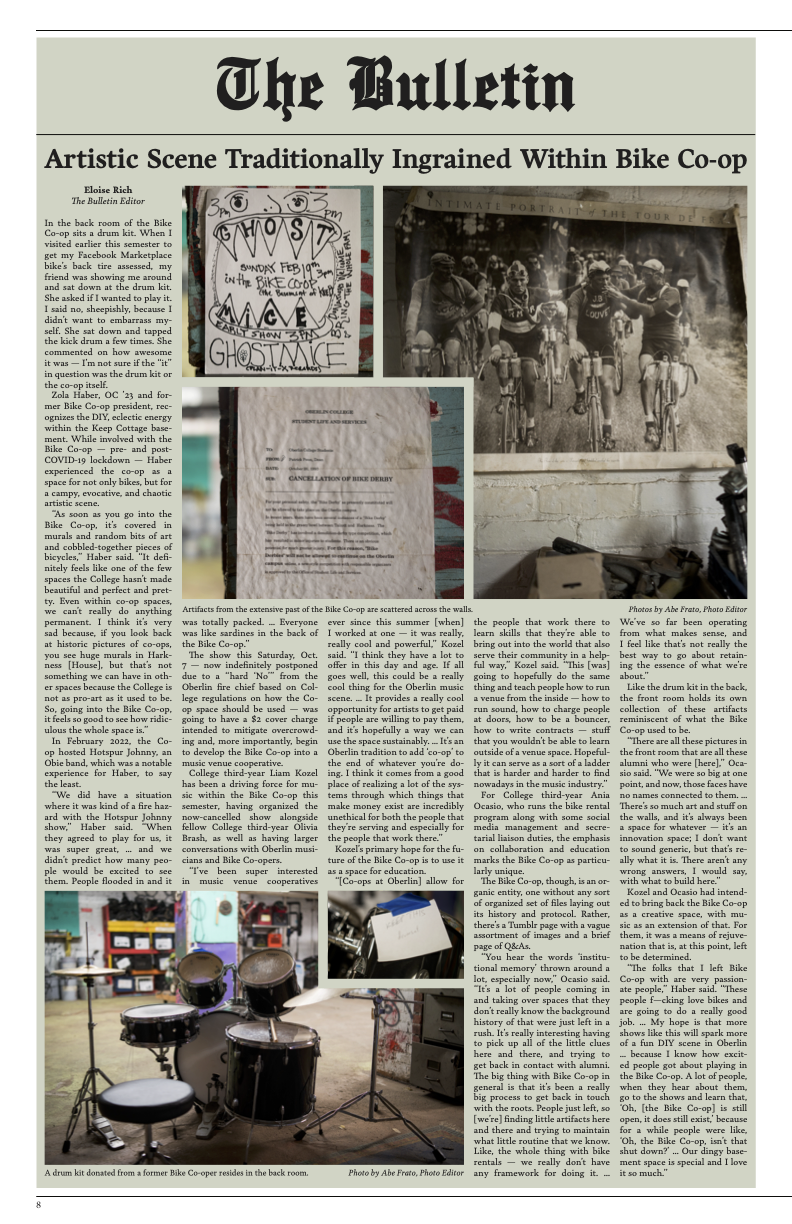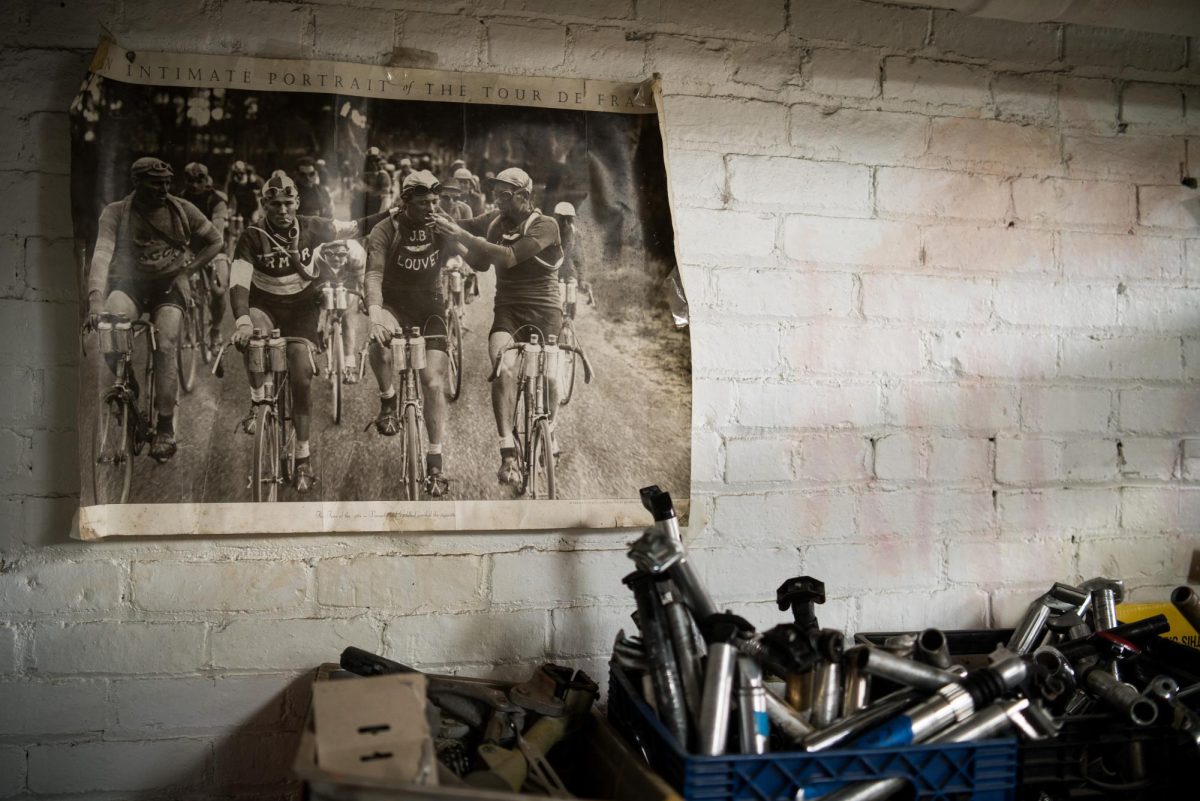In the back room of the Bike Co-op sits a drum kit. When I visited earlier this semester to get my Facebook Marketplace bike’s back tire assessed, my friend was showing me around and sat down at the drum kit. She asked if I wanted to play it. I said no, sheepishly, because I didn’t want to embarrass myself. She sat down and tapped the kick drum a few times. She commented on how awesome it was — I’m not sure if the “it” in question was the drum kit or the co-op itself.
 Zola Haber, OC ’23 and former Bike Co-op president, recognizes the DIY, eclectic energy within the Keep Cottage basement. While involved with the Bike Co-op — pre- and post-COVID-19 lockdown — Haber experienced the co-op as a space for not only bikes, but for a campy, evocative, and chaotic artistic scene.
Zola Haber, OC ’23 and former Bike Co-op president, recognizes the DIY, eclectic energy within the Keep Cottage basement. While involved with the Bike Co-op — pre- and post-COVID-19 lockdown — Haber experienced the co-op as a space for not only bikes, but for a campy, evocative, and chaotic artistic scene.
“As soon as you go into the Bike Co-op, it’s covered in murals and random bits of art and cobbled-together pieces of bicycles,” Haber said. “It definitely feels like one of the few spaces the College hasn’t made beautiful and perfect and pretty. Even within co-op spaces, we can’t really do anything permanent. I think it’s very sad because, if you look back at historic pictures of co-ops, you see huge murals in Harkness [House], but that’s not something we can have in other spaces because the College is not as pro-art as it used to be. So, going into the Bike Co-op, it feels so good to see how ridiculous the whole space is.”
In February 2022, the Co-op hosted Hotspur Johnny, an Obie band, which was a notable experience for Haber, to say the least.
“We did have a situation where it was kind of a fire hazard with the Hotspur Johnny show,” Haber said. “When they agreed to play for us, it was super great, … and we didn’t predict how many people would be excited to see them. People flooded in and it was totally packed. … Everyone was like sardines in the back of the Bike Co-op.”
The show this Saturday, Oct. 7 — now indefinitely postponed due to a “hard ‘No’” from the Oberlin fire chief based on College regulations on how the Co-op space should be used — was going to have a $2 cover charge intended to mitigate overcrowding and, more importantly, begin to develop the Bike Co-op into a music venue cooperative.
College third-year Liam Kozel has been a driving force for music within the Bike Co-op this semester, having organized the
now-cancelled show alongside fellow College third-year Olivia Brash, as well as having larger conversations with Oberlin musicians and Bike Co-opers.
“I’ve been super interested in music venue cooperatives ever since this summer [when] I worked at one — it was really, really cool and powerful,” Kozel said. “I think they have a lot to offer in this day and age. If all goes well, this could be a really cool thing for the Oberlin music scene. … It provides a really cool opportunity for artists to get paid if people are willing to pay them, and it’s hopefully a way we can use the space sustainably. … It’s an Oberlin tradition to add ‘co-op’ to the end of whatever you’re doing. I think it comes from a good place of realizing a lot of the systems through which things that make money exist are incredibly unethical for both the people that they’re serving and especially for the people that work there.”
Kozel’s primary hope for the future of the Bike Co-op is to use it as a space for education.
“[Co-ops at Oberlin] allow for the people that work there to learn skills that they’re able to bring out into the world that also serve their community in a helpful way,” Kozel said. “This [was] going to hopefully do the same thing and teach people how to run a venue from the inside — how to run sound, how to charge people at doors, how to be a bouncer, how to write contracts — stuff that you wouldn’t be able to learn outside of a venue space. Hopefully it can serve as a sort of a ladder that is harder and harder to find nowadays in the music industry.”
For College third-year Ania Ocasio, who runs the bike rental program along with some social media management and secretarial liaison duties, the emphasis on collaboration and education marks the Bike Co-op as particularly unique.
The Bike Co-op, though, is an organic entity, one without any sort of organized set of files laying out its history and protocol. Rather, there’s a Tumblr page with a vague assortment of images and a brief page of Q&As.
“You hear the words ‘institutional memory’ thrown around a lot, especially now,” Ocasio said. “It’s a lot of people coming in
and taking over spaces that they don’t really know the background history of that were just left in a rush. It’s really interesting having to pick up all of the little clues here and there, and trying to get back in contact with alumni. The big thing with Bike Co-op in general is that it’s been a really big process to get back in touch with the roots. People just left, so [we’re] finding little artifacts here and there and trying to maintain what little routine that we know. Like, the whole thing with bike rentals — we really don’t have any framework for doing it. … We’ve so far been operating from what makes sense, and I feel like that’s not really the best way to go about retaining the essence of what we’re about.”
Like the drum kit in the back, the front room holds its own collection of these artifacts reminiscent of what the Bike Co-op used to be.
“There are all these pictures in the front room that are all these alumni who were [here],” Ocasio said. “We were so big at one point, and now, those faces have no names connected to them. … There’s so much art and stuff on the walls, and it’s always been a space for whatever — it’s an innovation space; I don’t want to sound generic, but that’s really what it is. There aren’t any wrong answers, I would say, with what to build here.”
Kozel and Ocasio had intended to bring back the Bike Co-op as a creative space, with music as an extension of that. For them, it was a means of rejuvenation that is, at this point, left to be determined.
“The folks that I left Bike Co-op with are very passionate people,” Haber said. “These people f—cking love bikes and are going to do a really good job. … My hope is that more shows like this will spark more of a fun DIY scene in Oberlin … because I know how excited people got about playing in the Bike Co-op. A lot of people, when they hear about them, go to the shows and learn that, ‘Oh, [the Bike Co-op] is still open, it does still exist,’ because for a while people were like, ‘Oh, the Bike Co-op, isn’t that shut down?’ … Our dingy basement space is special and I love it so much.”



